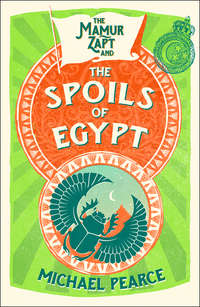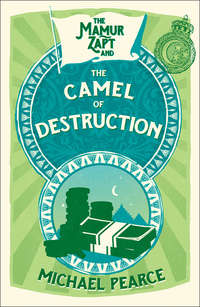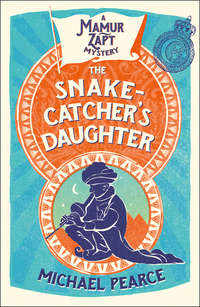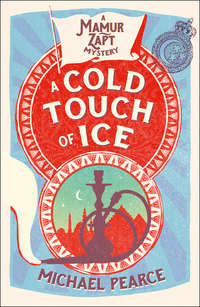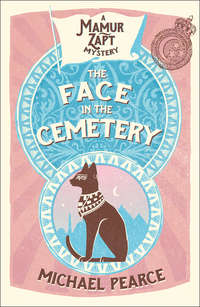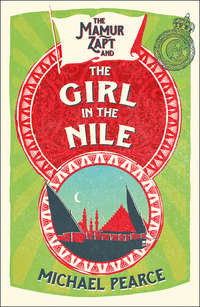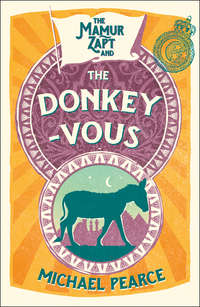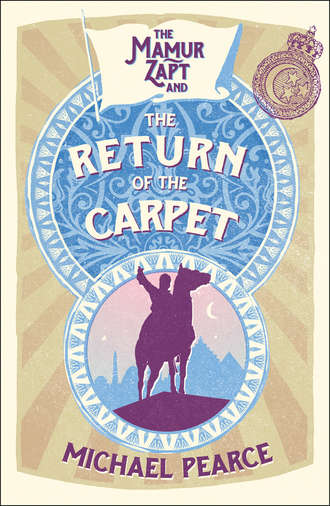
Полная версия
Mamur Zapt and the Return of the Carpet
‘What action?’
‘Notify the appropriate people. Stick a man on. Stay with the source.’
‘Sometimes it works,’ said Garvin.
‘It nearly always works,’ said McPhee loyally.
Garvin ignored him.
‘But those are the cases where you hear something. You didn’t even pick up a whisper this time?’
‘No.’
‘Slip-up,’ said Garvin.
Owen fought back.
‘Not necessarily,’ he said. ‘Anyone who’s plotting an assassination isn’t going to broadcast the fact. There may have been nothing to pick up.’
‘There’s always something to pick up in Cairo,’ said Garvin dismissively.
He turned his attention back to McPhee.
‘Buttoned up!’ he repeated. ‘You haven’t bloody even started! Whose man was he? What’s behind this? What are they after?’
‘The Parquet—’ Owen began.
Garvin swung round on him.
‘For Christ’s sake!’ he said. ‘Stop messing around! You know damned well this is nothing to do with them. It’s political.’
Garvin’s eyes bored into his.
‘So you’d better bloody get on with it,’ he said. ‘Mamur Zapt.’
CHAPTER 2
Owen was at the Place de l’Opéra shortly before seven the following morning. Early though he was, the Parquet was there before him.
Mahmoud was surprised.
‘The Mamur Zapt?’ he said.
He broke into a smile.
‘They have been leaning on you, too?’
‘They told me to stop messing around and bloody get on with it,’ said Owen.
‘Moi aussi.’
They both laughed.
‘It must be political,’ said Mahmoud.
‘What isn’t?’ said Owen.
‘And big.’
‘Why?’
‘Because you’re here.’
‘I honestly don’t know anything that makes it big,’ said Owen.
‘Nuri Pasha?’
‘I thought he’d retired from active politics.’
‘Those bastards never retire from active politics,’ said Mahmoud. He looked at Owen curiously. ‘Don’t you know? Really?’
‘No,’ said Owen.
‘I don’t really know either,’ said Mahmoud. ‘I just assumed—’ He broke off.
‘What did you assume?’
Mahmoud hesitated.
‘I’ve got no particular reason for assuming,’ he said at last. ‘I just took it for granted.’
‘What?’
‘That it was to do with Denshawai.’
‘Why should it be to do with Denshawai?’
‘Because Nuri Pasha was an Under-Secretary in the Ministry of Justice at that time.’
The Denshawai Incident had happened in 1906, just before Owen was transferred to Egypt and took up the post of Mamur Zapt.
Some British soldiers had been marching from Cairo to Alexandria and en route five officers had gone to the village of Denshawai to shoot pigeons. Round every Egyptian village were flocks of semi-wild pigeons kept for food and manure. No one was allowed to shoot them without permission from the head man of the village. The officers had misunderstood a guide who was with them and, thinking they were free to shoot, did so. The infuriated villagers had attacked the officers. Two had been wounded and one had died, of sunstroke it was thought, as he lay on the ground. The British-controlled Administration had taken exemplary action against the villagers. Four had been sentenced to death, others sent to prison, and seven had received fifty lashes.
The incident had sparked off widespread protests throughout Egypt. It had not been too popular with the new British Government, either. Word went that Cromer had been in effect forced out over the issue. He had been replaced as Consul General by the more pliable Sir Eldon Gorst, something which hadn’t, in the view of old hands, helped matters one little bit.
‘Denshawai flavours most things,’ said Owen slowly. ‘I don’t know that it is particularly important in this case. How closely was Nuri Pasha involved?’
‘Not very,’ said Mahmoud. ‘Which is why my assumption may be quite wrong.’
He looked around him.
‘And also why,’ he went on breezily, ‘I should get on with my reconstruction before the remaining half million of the Cairo population arrive on the scene to help me.’
The number of people on the Place was indeed beginning to grow. The first water-cart was coming down the Sharia el Maghrabi spraying water behind it to keep down the dust. The first forage camels were weaving their way along the Ezbekiyeh Gardens, great stacks bobbing precariously on their backs. The cab-men and donkey-boys lunched their animals on green forage, and from dawn a steady train of camels slouched over the Nile bridge to supply them. The first donkeys laden with heavy blocks of ice wrapped in dirty sacking were making their way to the hotels. People who had slept on the pavement, or on the wall next to the railings of the Gardens, or in the gutter (which was probably safer since they could not fall off), were beginning to stir. In the early morning it was sometimes quite difficult to get along because of the number of men lying about with their faces covered like corpses, sleeping as soundly as the dead. Now, as he watched some of the white or blue-gowned figures get to their feet, Owen was suddenly reminded of apocalyptic accounts of Judgement Day that he had heard from Welsh preachers. Not normally given to such visions himself, he thrust it out of his mind and concentrated on Mahmoud’s reconstruction. The Parquet followed French practice and usually required a ‘reconstruction’ of a crime by its investigators, and Owen, whose knowledge of standard police procedures was limited, was interested in seeing how Mahmoud approached it. Briskly, it appeared.
The Egyptian went over to a mark he had scuffed in the dust.
‘Nuri Pasha,’ he said, ‘was about here, facing out across the Place towards the Ezbekiyeh Gardens.’
‘According to Fakhri?’
‘And others.’
Mahmoud pointed to where a man was relieving himself in the road.
‘Fakhri’s arabeah was about there.’
‘He would have had a good view,’ said Owen.
‘Yes,’ said Mahmoud, ‘I think he did. Though between him and Nuri Pasha there were a lot of people.’
‘Did you find any of them?’
‘Yes. The first they knew of it was a loud bang. They looked round to see Nuri Pasha falling—’
‘Why was he falling?’ asked Owen. ‘He wasn’t hit.’
‘Don’t know,’ said Mahmoud. ‘I’ll have to ask him. Reflex, perhaps.’
He darted back and affected to stumble.
‘An old man,’ he said. ‘Dazed, winded and scared. Perhaps half-stunned. Anyway, he lay approximately here until about five hundred people took it upon themselves to carry him into the hotel.’
‘Who took the initiative?’
‘As I was saying,’ said Mahmoud, ‘about five hundred of them. Each one says.’
He looked up and down the road and then walked over to another mark.
‘Meanwhile, an ordinary fellah who had attempted to run away immediately after the shot was seized and brought to the ground, or tripped, or just fell over, about here. Definite, because he stayed there, unconscious, till the police came and one constable, brighter than most, marked the spot.’
‘That’s where he was taken,’ said Owen. ‘Where was he when he fired the shot?’
‘Or when the shot was fired. Don’t know. Fakhri Bey said he moved to the right, so if we move to the left—’ He counted out four paces. ‘He might have been standing here.’
‘About twelve feet from Nuri.’
‘In which case,’ said Mahmoud, ‘why didn’t he hit him?’
‘It’s more difficult than you might think,’ said Owen, ‘even at twelve feet. Especially if you’ve never fired a revolver before.’
‘Which might well have been the case,’ said Mahmoud. ‘Why is it so difficult?’
‘It kicks back in your hand when you fire,’ said Owen. ‘If you’re not holding it properly the barrel jerks upward.’
‘If the shot went upward,’ said Mahmoud, ‘how did it hit the lemonade-seller?’
‘Could have ricocheted.’
‘Off what?’
Mahmoud moved back to where Nuri Pasha had been standing. Owen took up the position they had guessed at for the assailant.
‘Off the statue,’ said Owen. ‘Maybe.’
They went over to the statue of Ibrahim Pasha and examined it.
Mahmoud put his finger on a mark.
‘Yes?’ he said.
‘Yes.’
They became aware that a small crowd was watching them with interest.
‘I think your half million is beginning to arrive,’ said Owen.
‘It’s unreal to reconstruct without a crowd,’ said Mahmoud. ‘It’s impossible with one.’
He walked across the Place to where Fakhri might have observed the scene from his arabeah. For a moment he stood there looking. Then he walked slowly back to Owen.
‘Just fixing it in my mind,’ he said, ‘before I talk to them.’
Two heavily-laden brick carts emerged at the same time from adjoining streets and then continued across the Place abreast of each other. A car coming out of the Sharia el Teatro was obliged to brake suddenly and skidded across in front of two arabeahs which had just pulled out of the pavement. All three drivers jumped down from their vehicles and began to abuse the drivers of the brick carts, who themselves felt obliged to descend to the ground, the better to put their own point of view. Other vehicles came to a halt and other drivers joined in. Some Passover sheep, painted in stripes and with silver necklaces around their necks, which had been trotting peacefully along beside the Ezbekiyeh Gardens, abandoned the small boy who was herding them and wandered out into the middle of the traffic. In a moment all was confusion and uproar. The Place, that is, had returned to normal.
‘That,’ said Mahmoud resignedly, ‘is that.’
The two had taken a liking to each other and Mahmoud, unusually for the Parquet, invited Owen to be present at his interrogation. It took place in the Police Headquarters at the Bab el Khalk. They were shown into a bare, green-painted room on the ground floor which looked out on to an enclosed square across which the prisoner was brought from his cell.
He looked dishevelled and his eyes were bloodshot but otherwise he seemed to have completely recovered from his heavy drugging. He looked at them aggressively as the police led him in. In Owen’s experience a fellah, or peasant, caught for the first time in the toils of the alien law tended to respond either with truculent aggression or with helpless bewilderment. This one was truculent.
After the preliminaries Mahmoud got down to business.
‘Your name?’
‘Mustafa,’ the man growled.
‘Where are you from?’
‘El Deyna is my village,’ he said reluctantly.
El Deyna was a small village on the outskirts of old Cairo just beyond the Citadel.
‘You have work in the fields,’ said Mahmoud. ‘What brought you to the city yesterday?’
‘I came to kill Nuri Pasha,’ said the other uncompromisingly.
‘And why did you want to kill Nuri Pasha?’
‘He dishonoured my wife’s sister.’
‘Your story will be checked,’ said Mahmoud.
He waited to see if this had any effect on the man but it did not.
‘How did he dishonour your wife’s sister?’
Mustafa did not reply. Mahmoud repeated the question. Again there was no response. The fellah just sat, brawny arms folded.
Mahmoud tried again.
‘Others will tell us if you do not,’ he said.
The man just sat stubbornly there.
‘Come, man,’ said Mahmoud, not unkindly. ‘We are only trying to get at the truth that lies behind this business.’
‘There is one truth for the rich,’ the villager said bitterly, ‘and another for the poor.’
‘The truth we seek,’ said Mahmoud, ‘is not necessarily that for the rich.’
‘The rich have all the weapons,’ the man said, ‘and you are one of the weapons.’
Unexpectedly, Mahmoud seemed to flinch.
‘I would not have it so,’ he said mildly.
The man had noticed Mahmoud’s reaction. It seemed to mollify him.
‘Nor I,’ he said, mildly too. ‘I would not have it so.’
He rubbed his unshaven chin.
‘Others will tell you,’ he said. ‘My wife’s family works in the fields for Nuri Pasha. One day Nuri went by. He saw my wife’s sister. He said: ‘Tell her to bring some melons to the house.’ She brought the melons and a man took her in. He took her to a dark room and Nuri came to her.’
‘That was wrong,’ said Mahmoud, ‘but it was wrong also to try to kill for that.’
‘What was I to do?’ the man said passionately. ‘I am a poor man and it is a big family. Now she is with child. Before, there was one mouth and she could work in the fields. A man wanted her and would have taken her at a low price. Now there are two mouths and she has been dishonoured. No one will take her now except at a large price. And how can I find a large price for her?’
Unconsciously he had laid his hand on the table palm uppermost as if he was pleading with Mahmoud.
‘How?’ he repeated vehemently. ‘How? I have children of my own.’
Mahmoud leaned across the table and touched him sympathetically on the arm.
‘There is worse, friend,’ he said. ‘How will they manage without you when you are gone?’
The passion went out of the man’s face.
‘There will be money,’ he said, and bowed his head, ‘without me.’
‘How can that be,’ asked Mahmoud softly, ‘when you have none?’
‘Others will provide.’
‘What others? Your family?’
‘Others.’
Both sides seemed to consent to a natural pause, which lasted for several minutes. Owen was impressed. He knew that if he had been conducting the interrogation, in the distant English way, he would never have reached the man as Mahmoud had done.
Mahmoud leaned forward now and touched Mustafa on the sleeve.
‘Tell me, brother,’ he said, ‘about your visit to the city yesterday.’
‘I went to the city,’ said the man, almost as if he was reciting, ‘and there were many people. I was one of a crowd. And I saw that bad one and I fired my gun at him. And he fell over, and I gave thanks to Allah.’
‘How did you know where to find the bad one?’ asked Mahmoud.
The man frowned.
‘I do not know,’ he admitted. ‘He was suddenly there before me.’
‘Someone told you, I expect,’ said Mahmoud.
The man did not pick this up.
‘Have you been to the Place before?’
Mustafa shook his head.
‘Never.’
‘And yet you knew where to find him,’ Mahmoud observed.
He waited, but again the man did not pick it up.
Mahmoud switched.
‘Where did you get the gun?’
The man did not reply.
‘Did the one who told you where to find the bad one also give you the revolver?’
Again there was no reply.
‘If the rich have their weapons,’ said Mahmoud, ‘and I am one of them, you, too, are a weapon. Who is wielding you?’
‘Not the rich!’
‘When the tool is broken it is thrown away.’
‘I am not broken,’ said the man defiantly.
‘As a tool you are broken. As a weapon.’
‘My task is done,’ said the man. ‘I am satisfied.’
‘Nuri is still alive.’
The man looked at him, startled.
‘Didn’t you know? The shot missed.’
‘Is that the truth?’
‘On the Book.’
The man buried his face in his hands.
‘I am a poor weapon.’
‘You have fed too much on the drug,’ said Mahmoud.
‘It gave me the power,’ said the man from behind his hands.
‘It took away your power.’
The man shook his head.
‘Who gave it to you?’
‘A man.’
‘The same who gave you the gun?’
Again the shake of the head.
‘The one who showed you where to find Nuri Pasha?’
The shaking had become continuous. Owen doubted now if it meant negation.
‘The one who will provide for your family when you are gone?’ Mahmoud went on inexorably.
The shaking stopped and the man raised his head.
‘Inshallah,’ he said. ‘If God wills.’
He would say no more and after several further attempts to resume the conversation Mahmoud ordered him to be returned to the cells.
That afternoon they went to el Deyna. Mahmoud decided, on the spur of the moment, that he would like to talk to Mustafa’s family. Then, equally on the spur of the moment, he decided he would ask Owen to go with him.
Owen accepted at once. He liked Mahmoud and, besides, he had grown sensitive enough to Arab style by now to know that if he did not respond with equal warmth it would immediately chill the relationship that was developing between them.
He was, however, a little surprised. Relations between the ministries were not normally as close as this. He wondered whether the invitation was solely the product of an impulse of friendliness. Mahmoud was no fool. Perhaps, operating alone in what might turn out to be politically sensitive areas, he felt the need to guard his back. If so, Owen could certainly sympathize with him.
They met after lunch at the Ataba el Khadra, the terminus for most of the Cairo tramways, and took a tram to the Citadel.
Although it was still relatively early in the afternoon, and extremely hot, the Ataba was, as always, full of people. The ordinary population of Cairo was still impressed by trams and treated them very seriously. To board a tram at the terminus meant forcing one’s way through a mass of street-sellers, all concerned that the passengers might perish en route for lack of sustenance. Water-sellers, peanut-sellers, lemonade-sellers, Turkish-delight-sellers, sellers of tartlets, sweets and sherbet competed for custom.
The tram itself was, of course, crowded. Passengers hung over the driver in his cab and shared his agitation at the continual excesses of arabeah drivers. They bulged out of the tram itself and clung on to the steps. One or two hardy spirits climbed up on to the roof, from which they were dislodged with difficulty by a determined constable, only to be replaced by equally tenacious clamberers at the next stop.
Owen enjoyed all this, but even he had had enough, in the heat, by the time they got to the Citadel. They changed with relief into the small bus which would take them out into the country.
Here, too, there was difficulty in finding a seat. A large fellahin woman with a load of water-melons occupied the whole rear of the bus.
‘Come, mother,’ said Mahmoud. ‘Move your fruit. They take up more space than people.’
The woman started to move the melons and then looked up at Mahmoud.
‘Why is the Englishman here?’ she asked in Arabic, not thinking that Owen understood.
‘He is with me,’ said Mahmoud.
‘He should be in a motor-car,’ said the woman, ‘or in an arabeah.’
The bus had fallen quiet.
Conscious that she held the stage, the woman reached over and picked up two large melons.
She showed them to the passengers.
‘Two fine ones,’ she said.
She cast a sidelong glance at Owen.
‘As big as your balls, Englishman,’ she added, giving the other passengers a wink.
‘As big as they would need to be, woman,’ said Owen, ‘were I your husband.’
The bus exploded with delighted laughter.
The woman moved her melons, with good grace now, having enjoyed the exchange as much as anyone else, and Owen and Mahmoud sat down.
In a way, it was nothing, but Owen had sensed a current of feeling in the bus that had surprised him. Most Englishmen in Egypt would have said that the country-dwelling fellahin were all right, that it was only in the city that there was trouble. He had defused the current so far as he was concerned and the atmosphere was now quite relaxed. But that it should exist at all was significant.
Mahmoud must have sensed the current, too, for throughout the rest of the journey he kept the conversation at the level of general chit-chat; in Arabic.
The village omda, or headman, showed them to Mustafa’s house.
It was a mud brick house with three rooms and a ladder going up to the roof. The floor was beaten earth. In the first room, at night, a donkey and a water-buffalo lay down together. In the inner rooms the family lived, ate and slept. On the roof were the household stores and the rabbits.
There seemed to be at least eight or nine people in the inner rooms, two old people and six or seven children. When the omda explained the purpose of the visit, they all retreated into the furthest room, leaving Mustafa’s wife alone with Mahmoud, Owen and the omda. She held her veil up in front of her face the whole time they were there.
They sat down cross-legged on the floor. After a moment Mahmoud began.
‘Tell me about your husband,’ he said. ‘Is he a good man?’
There seemed to be a shy nod of assent.
‘Does he beat you?’
Owen could not detect any response, but the omda said: ‘He is a good man. He beats her only when she deserves it.’
‘Your children: does he beat them?’
This time there was no mistaking the denial.
‘Those old ones: are they your family or his?’
‘One is hers. One is his,’ said the omda.
‘Tell me about your sister,’ said Mahmoud.
The woman put the veil completely over her face and bowed her head down almost to her knees.
Mahmoud waited, but she said nothing.
‘I am not here to judge,’ he said, ‘merely to know.’
The woman bent her body to the left and right in agitation but could not bring herself to reply in speech.
‘She is ashamed,’ said the omda. ‘Her family is dishonoured.’
‘And Mustafa felt this shame greatly?’ asked Mahmoud.
The woman seemed to signify assent.
‘He took it into his heart?’
More definite this time.
Mahmoud turned to the omda.
‘He spoke about it? Some nurse a hurt in silence, others speak it out.’
‘He spoke it out,’ said the omda.
Mahmoud considered for a moment or two.
‘It is hard to bear dishonour,’ he said at last, ‘but sometimes it is better to bear dishonour than to lift your hand against the great.’
‘True,’ said the omda neutrally, ‘but sometimes a dishonour is too great to be borne.’
‘Was that so with Mustafa?’
‘I do not know,’ said the omda. ‘Mustafa is a good man.’
Mahmoud turned back to the woman and shifted tack.
‘Where is your sister staying?’ he asked.
‘With friends,’ said the omda.
‘In her village or in this?’
‘She will not show her face,’ said the omda, ‘either in her village or in this.’
‘What will happen when her child comes?’ asked Mahmoud. ‘It is a lot to ask of friends.’
The omda was silent. ‘I do not know,’ he said at last.
The woman broke in unexpectedly.
‘She will stay with me,’ she said determinedly.
The omda looked troubled but said nothing.
‘How will you manage?’ asked Mahmoud.
‘The way we have always managed,’ said the woman bitterly.
‘It is hard for a woman to manage alone,’ said Mahmoud. ‘Even if she is used to it.’
The eyes above the veil seemed to flash.
‘When did your husband begin taking hashish?’
The omda made to answer but the woman cut across him.
‘He has always taken hashish,’ she said, ‘a little.’
‘But recently,’ said Mahmoud, ‘he has started taking more.’
Again the eyes seemed to register the remark, but otherwise there was no response.
‘Where did he get it?’
‘There are always those willing to sell,’ said the omda.
‘Whom you know?’
The omda spread his hands. ‘Alas, no,’ he said.
‘There are always those willing to sell,’ said Mahmoud. ‘At a price.’
He leaned forward and addressed the woman directly,
‘Money for hashish,’ he said, ‘comes at the cost of money for food. His family was hungry. Why did he buy hashish?’
‘It made him strong,’ the woman said.
‘Strong in the fields? Or strong in the bed?’
‘In the bed,’ said the woman. ‘In the fields too.’


